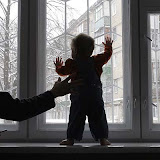What is true?
After Chernobyl, they shot dogs.
Soldiers went around to abandoned villages, killing pets and guard dogs to
prevent them from spreading radiation or rabies.
After Fukushima, they feed the
dogs. And cats. Several different non-profits travel through the empty villages
outside the Exclusion Zone; some have temporary permission to enter the 30-Kilometer
Zone to feed or catch strays.
During my time in Chernobyl and Fukushima,
I heard a lot of unbelievable stories. Some of them impossible,
some improbable, yet many of them true.
It happens during any disaster: reports
contradict, rumors fly, official statements don’t mesh with personal
experiences. It’s clear why this happens. In a crisis, the situation changes
constantly. News agencies scramble to tell what they know, piecemeal, because
no one yet has the big picture. Government officials mislead or are just poorly
informed. Even the eyewitnesses have selective memories, clouded by fear and
adrenaline. Then the gossip starts, hyperbolic, opinionated, pointing fingers.
Before long a consensus story
emerges, but there is little reason to trust it, built as it is on assumptions
and half-truths. Now, two years later, these beliefs start to congeal into
history, accurate or not. It’s a wonder we ever know anything about anything.
Here is one tale I heard
repeatedly in Fukushima. I haven’t been able to confirm it, but it fascinates
me. I share it with the caveat that it may be false. In many evacuated places
in Fukushima Prefecture, the story goes, residents were not required to leave. They
were advised to evacuate but never forced. Since Japanese culture esteems
social harmony and conformity, I was told, most people did whatever was asked,
or what their neighbors did, and left.
(How do refugees decide to stay
or go? I hope some sociologist is studying this. I want to know.)
In contrast, in Ukraine, some residents
fought to stay. Ordered by the police and military to evacuate, many refused. Over
2,000 villagers snuck back into the Chernobyl Exclusion Zone and have lived the
remainder of their lives there.
Outrageous? I’m wary of
reporting unverified stories from Fukushima because I myself don’t know what to
believe. Instead, here is a:
QUICK QUIZ: True or False:
1. After the Chernobyl accident,
conscripts removed radioactive debris using nothing more than shovels and
wheelbarrows.
2. People steal radioactive
radiators from the Chernobyl zone to sell for scrap metal.
3. Last month, a section of roof
at the Chernobyl plant collapsed due to heavy snow.




